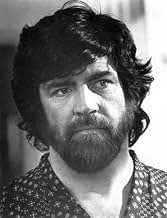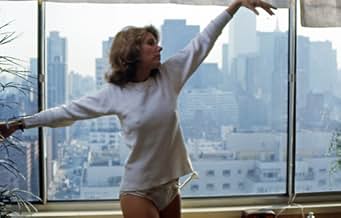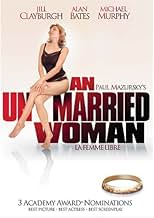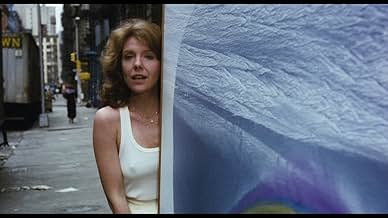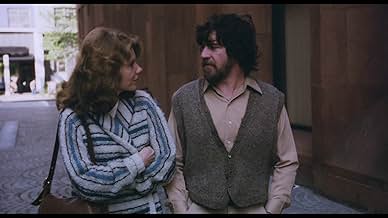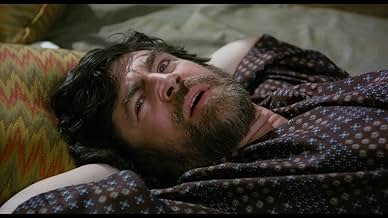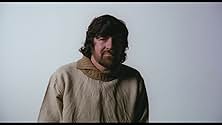अपनी भाषा में प्लॉट जोड़ेंA Manhattan woman struggles with her identity as she tries to move on from a painful divorce.A Manhattan woman struggles with her identity as she tries to move on from a painful divorce.A Manhattan woman struggles with her identity as she tries to move on from a painful divorce.
- 3 ऑस्कर के लिए नामांकित
- 6 जीत और कुल 18 नामांकन
- Sue
- (as Pat Quinn)
- Cabbie
- (as Chico Martinez)
फ़ीचर्ड समीक्षाएं
The wonderful Paul Mazursky created this 1978 landmark slaute to women's liberation and the film wipes the floor with the messy urban horror of 1977's Looking for Mr. Goodbar: Goodbar's makers ultimately had no respect for their female protagonist but Mazursky scores in his depiction of female self-respect and love.
Jill Clayburg's miraculous performance as Erica was snubbed at the Academy Awards in favor of Jane Fonda's more 'tolerable' female in Coming Home but if you look closely you'll see there's no comparison and Clayburg hits all the right notes while displaying Erica's overwhelmingly complex feelings. Perhaps Erica's unique strength was too much for many male Academy members so they rewarded the typical moony-eyed housewife character instead. Regardless of that, Clayburg makes a brilliant lead and her lonely journey through New York-chic (art exhibits, bars, therapists, narcisstic artists) makes for great viewing. (The very brief encounters Erica has with a handsome blonde man at the coatcheck before and after she's been hit with the news from her husband are a nice touch!) There's a rare level of intimacy between the actors in all of the scenes but especially the girl group talks: the words sound surprisingly like they belong to the actors and Mazursky's ear for dialogue is sharp and refreshingly to-the-point.
Michael Murphy as the wayward husband, Alan Bates as the new love interest, and Cliff Gorman -whom I last saw as the bitchy, effeminate in The Boys in the Band!- as a male chauvinist provide exceptional support as the men in Erica's life. The only thing that marres the beauty of this film is its awful, piercingly shrill, '70's saxophone musical score.
"Scenes from a Marriage". Throughout the film we are introduced to one terrific personality after another--each distinctively drawn. From her affluent circle of friends, to the quirky, genuinely intriguing artistic types of the downtown art scene (Soho before it became SO commercial), to the assorted people she
meets on her journey of coping and understanding such as her therapist
(portrayed by the great psychologist and author, Penelope Russianoff, who was a fixture on New York's Upper Westside for years), we are treated to a wealth of fascinating characters. The movie resonates with warmth and understanding.
Jill Clayburgh's Erika is a contemporary tragic/comic heroine. She's beautiful and classy and funny and her emotions--for anyone who has gone through
divorce or separation or simply difficult marital situations--are absolutely dead- on accurate. What is very interesting some 25 years after the movie debuted is that it has not aged one single bit--the characters remain delightful, the
emotions as real as ever, and the New York milieu as varied and fascinating as it still is today (and probably always has been.) A great, entertaining, and endearing film!
Here Mazursky shows that, whatever else he is accused of being or doing or not-doing (with which I don't always agree or disagree), is a thoughtful director taking a good, long, realistic look at this drama and at more than just its central character. I liked that some scenes ran on for a bit longer than some people find necessary or comfortable, because this is how life's scenes often play out beyond one's wanting them to end swiftly and tidily: indeed, the slight overrunning of some scenes contributes what today might be called "value-added" realism to 'An Unmarried Woman.' After all, Erica has, involuntarily, been thrust into a new life in which she's not at ease in every one of its developing, novel situations.
The saxophone score - probably considered hip in 1977 - is today often more than a trifle annoying; but then it could be said that the score is part of the film's capture of the 70's zeitgeist: like all decades the 70's had its annoyances (not the least of which was the dismal monotony of disco, and all those decor-saturating browns, olives (avocado it was called!), honey-golds, and tawny oranges).
The cinematography here is quite good, nicely tailored to the film's intimate subject, situations, and relationships. Throughout the acting is uniformly good; Jill Clayburgh's effort here is, and will remain I expect, a cinema original and classic. I especially enjoyed - not when I first saw the film but much more so now in 2006 - Cliff Gorman's portrayal of self-satisfied, on-the-make Charlie. Andrew Duncan in the minor role of Bob lends great verisimilitude with his pre-"hair systems" comb-over but especially with the touch of about-to-be-over-the-hill despair in Bob's attempt to bed Erica; Bob demonstrates that most men in that decade, beginning as they were to be flummoxed by emerging liberated women and feminism, still clung to the suddenly obsolescent notion that a divorcée would and should be eager to remarry in order to traditionally assure her security and peace of mind.
At my first viewing I agreed with what Tanya, Erica's therapist, said to Erica about guilt being a manufactured, unnecessary emotion. But a good many more years of living have taught me that guilt is not manufactured, and that without it a person is doomed to emptiness and isolation, and a society is doomed to decadence, and even to barbarism. Rather Tanya should have held that guilt is natural, and that it is one's mature management of it that enables one to distinguish, in oneself and in others, venality and narcissism from generosity of spirit.
'An Unmarried Woman' still stands on its own - more as a socio-cultural than as a cinematic landmark. It's that rare kind of film that's worth watching every five or ten years, if only to help us to recall where we've come from, and to help us to profit from, or to enjoy, a sense of where we might be going.
This movie was made when divorce was still a hot topic and women were just coming into the workforce and still tied into identifying themselves through marriage. But the film is still relevant today (we all deal with rejection of one sort or another). The rest of the cast is superb and there are great shots of New York circa 1978.
Ten stars.
The mid to late 70s was New York's era as the 'fashionable city' in the days of fashionable cities. NYC took the torch from Swinging Sixites London as the city every fashionable person wanted to go to, live in, know... It was the 'Disco' capital of the world. It was where the most interesting films were set. It where all the happening artists lived and Unmarried Woman caught the zeitgeist of that time. Even jogging was a new phenomenon back then and NY lead the way with it and 'everyone' wanted to know what people were up to there, even about the jogging. If you'd never been to NYC you were missing out. If you had been to NY and or knew NY, back in 1978, you bragged about it. While at the same time the city was officially broke and in many ways seemed to be crumbling into the sea.
Unmarried Woman was a product of all this fascination, both negative and positive, with the city at the time. Trivial details about life in NY had a sort of cachet. Therefore, on reflection, what may seem trite to viewers today, had a strange sort of value back then.
Some people sneer at Erica's seemingly privileged position in society. How dare she be so miserable, have you seen where she lives? Well, guess what, wealthy women also feel sad when they are rejected by their husbands for a younger model. And guess what, some people like to look at the lives of people who live in beautiful apartments with views of the river and whizz downtown in yellow cabs on bright New York mornings. In fact it's the contrast between the material privilege and the sadness and loss that makes this film work.
Some people are also alarmed by the strong, upfront musical score. Sorry about that. Music in the 70s was strong and upfront in our lives, not just background noise. The wailing saxophone was the pop instrument of the time and the excellent, very 70s soundtrack, is one of the aspects that make watching this film such a powerful, nostalgic and enjoyable ride.
Unmarried Woman does have its flaws. It is at times somewhat simplistic and personally, I'm not so sure that newly unmarried woman, Erica, was as much of a catch as we're made to believe. Every man she meets seems to fall at her feet.
This is very much a film of its time and a very interesting time and place it was. I wish they still made films like this today, about adults, for adults, with strong subtle performances, without both eyes on the cash register and without some dreary, over-exposed, under talented box office 'star' drudging her way through her lines. There was something very adult and sophisticated about American cinema in the 70s and Unmarrried Woman takes its place in the long list of films that were a part of that.
The film was beautifully shot, beautifully scored, excellently acted and I'm glad it's now available for us to see, as a reminder of a short but memorable time and place.
क्या आपको पता है
- ट्रिवियाDr. Penelope Russianoff, who plays Erica (Jill Clayburgh)'s therapist Tanya, was an actual practicing psychologist. The counseling sessions were filmed in her actual penthouse apartment on West 86th Street in New York, where she saw her patients. She worked for two and a half days and was paid US $2500. She was cast after having been recommended to director Paul Mazursky by "Girlfriends" (1978) director Claudia Weill. Russianoff said that she improvised most of her dialogue, which was based on the type of therapy she gave her patients. After the movie was launched, Russianoff became a mini-celebrity. She said the role gave her "instant celebrity-hood," being recognized on the streets of New York, where she signed autographs, and got a number of new clients. She wrote several self-help books in the 1980s, including "Why Do I Think I Am Nothing Without a Man?" (1988), a book first published about a decade after this film, but with a title and subject matter that were reflective of this picture.
- गूफ़The boom is clearly visible for several seconds during the art gallery scene.
- भाव
[first lines]
[Martin and Erica are jogging along the river]
Martin: Jesus Christ! Look at this! My sneaker's ruined!
Erica: They're only $35.
[Erica takes Martin's shoe and cleans it off for him]
Martin: Fucking city's turning into one big pile of DOG SHIT!
[shouting at passing traffic]
Martin: Come on out and take a crap on me--everybody else is. Fuck!
[Martin lights a cigarette]
Erica: ...been jogging for 2 1/2 miles - you're giving yourself lung cancer.
Martin: I'll tell you something, Erica: the longer I'm married to you, the more you sound like my mother.
Erica: Clean your own sneaker.
[throws shoe at Martin]
Martin: I think you wanted me to step in it.
Erica: [laughing] You're going crazy, Martin.
Martin: I am?
Erica: [laughing] Yes.
[Martin tosses his shoe over his shoulder into the river. Erica jogs away, and Martin jogs after]
- क्रेज़ी क्रेडिटFor Betsy
- साउंडट्रैकSwan Lake, Op.20
(1877) (uncredited)
Written by Pyotr Ilyich Tchaikovsky
Excerpts danced by Jill Clayburgh
टॉप पसंद
- How long is An Unmarried Woman?Alexa द्वारा संचालित
विवरण
बॉक्स ऑफ़िस
- US और कनाडा में सकल
- $2,40,00,000
इस पेज में योगदान दें



